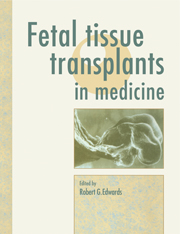Book contents
- Frontmatter
- Contents
- List of contributors
- Preface
- 1 Differentiation and transplantation of embryonic cells in mammals
- 2 Organogenesis and central nervous system development
- 3 Experimental human hematopoiesis in immunodeficient SCID mice engrafted with fetal blood-forming organs
- 4 Ontogeny of human T- and B-cell immunity
- 5 The procurement of human fetal tissues for clinical transplantation. Practice and problems
- 6 Transplantation of fetal haemopoietic and lymphopoietic cells in humans, with special reference to in utero transplantation
- 7 The biology of fetal brain tissue grafts: from mouse to man
- 8 Clinical results of transplanting fetal pancreas
- 9 The suitability of fetal and infantile donors for corneal transplantation
- 10 Transplantation of ovaries and testes
- 11 Cell grafting and gene therapy in metabolic diseases
- 12 The low temperature preservation of fetal cells
- 13 Law and ethics of transplanting fetal tissue
- Appendix: Code of practice on the use of fetuses and fetal material in research and treatment
- Brief bibliography on various aspects of transplanting fetal 337 tissue
- Index
11 - Cell grafting and gene therapy in metabolic diseases
- Frontmatter
- Contents
- List of contributors
- Preface
- 1 Differentiation and transplantation of embryonic cells in mammals
- 2 Organogenesis and central nervous system development
- 3 Experimental human hematopoiesis in immunodeficient SCID mice engrafted with fetal blood-forming organs
- 4 Ontogeny of human T- and B-cell immunity
- 5 The procurement of human fetal tissues for clinical transplantation. Practice and problems
- 6 Transplantation of fetal haemopoietic and lymphopoietic cells in humans, with special reference to in utero transplantation
- 7 The biology of fetal brain tissue grafts: from mouse to man
- 8 Clinical results of transplanting fetal pancreas
- 9 The suitability of fetal and infantile donors for corneal transplantation
- 10 Transplantation of ovaries and testes
- 11 Cell grafting and gene therapy in metabolic diseases
- 12 The low temperature preservation of fetal cells
- 13 Law and ethics of transplanting fetal tissue
- Appendix: Code of practice on the use of fetuses and fetal material in research and treatment
- Brief bibliography on various aspects of transplanting fetal 337 tissue
- Index
Summary
THE LONG-TERM PROSPECTS FOR A SUCCESSFUL CORRECTION of inherited lysosomal enzymatic deficiencies by the transplantation of enzymatically normal cells depend on a series of interconnected factors (Nadler, 1980; Desnick & Grabowski, 1981). The most important condition is the availability of donor cells capable of producing and secreting specific enzymes, whilst not expressing histocompatibility antigens which may induce an immunological rejection. The donor cells should also be immunologically incompetent and, consequently, unable to trigger graft-versus-host (GVH) reactions. Another essential factor is that the lysosomal enzyme released by the donor cells should be taken up by the enzymatically deficient cells of the host via specific receptors.
In this chapter, I will analyze these and other requirements for achieving a successful transplant and summarize the results of studies performed to correct selected enzymatic deficiencies, particularly in patients with mucopolysaccharidoses (MPS), by transplanting normal fetal fibroblasts or amniotic epithelial cells. Alternative strategies, such as the use of somatic gene therapy, will be outlined briefly in view of their possible future applications.
Grafting fibroblasts or amniotic epithelial cells
The rationale for choosing fibroblasts or amniotic epithelial cells
The willingness to risk failure is an essential component of most successful initiatives. The unwillingness to face the risk of failure - or an excessive zeal to avoid all risks - is, in the end an acceptance of … abdication’ (Shapiro, 1990, p. 609).
Perhaps these words best summarize the hesitations and doubts which accompanied some of the early attempts performed in order to correct selected lysosomal enzymatic deficiencies by transplanting normal fibroblasts or amniotic epithelial cells. Both types of cells were known to have intrinsic disadvantages when compared to bone marrow cells, which divide and spread rapidly - ultimately producing larger quantities of a specific enzyme - but may be rejected, if HLA incompatible, or induce GVH reactions (Hirschhorn, 1980; Parkman, 1986). On the other hand, the most important incentive for grafting fibroblasts or amniotic epithelial cells was the knowledge that these cells were not going to be harmful to the transplanted patient, since they lack, or produce only small quantities of, major histocompatibility complex (MHC) antigens and do not transform readily into cancer cells.
- Type
- Chapter
- Information
- Fetal Tissue Transplants in Medicine , pp. 281 - 298Publisher: Cambridge University PressPrint publication year: 1992

